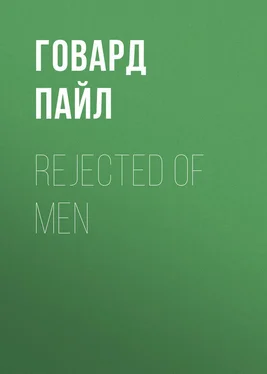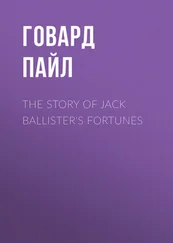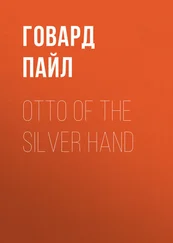Говард Пайл - Rejected of Men
Здесь есть возможность читать онлайн «Говард Пайл - Rejected of Men» — ознакомительный отрывок электронной книги совершенно бесплатно, а после прочтения отрывка купить полную версию. В некоторых случаях можно слушать аудио, скачать через торрент в формате fb2 и присутствует краткое содержание. Жанр: foreign_antique, foreign_prose, на английском языке. Описание произведения, (предисловие) а так же отзывы посетителей доступны на портале библиотеки ЛибКат.
- Название:Rejected of Men
- Автор:
- Жанр:
- Год:неизвестен
- ISBN:нет данных
- Рейтинг книги:3 / 5. Голосов: 1
-
Избранное:Добавить в избранное
- Отзывы:
-
Ваша оценка:
- 60
- 1
- 2
- 3
- 4
- 5
Rejected of Men: краткое содержание, описание и аннотация
Предлагаем к чтению аннотацию, описание, краткое содержание или предисловие (зависит от того, что написал сам автор книги «Rejected of Men»). Если вы не нашли необходимую информацию о книге — напишите в комментариях, мы постараемся отыскать её.
Rejected of Men — читать онлайн ознакомительный отрывок
Ниже представлен текст книги, разбитый по страницам. Система сохранения места последней прочитанной страницы, позволяет с удобством читать онлайн бесплатно книгу «Rejected of Men», без необходимости каждый раз заново искать на чём Вы остановились. Поставьте закладку, и сможете в любой момент перейти на страницу, на которой закончили чтение.
Интервал:
Закладка:
Howard Pyle
Rejected of Men / A Story of Today
THIS is the story of the scribes, pharisees, priests, and Levites, and of certain Romans. It is intended as a phase of that divine history already told to the world, but now told from another stand-point and translated from the ancient Hebrew habits of life into modern American, so that the reader may more readily understand the circumstances that directed our actions. If it has been told aright, he may see why it was that we crucified the Truth.
We–scribes and pharisees–have been vilified and abused for nineteen hundred years because we acted as the circumstances of our lives compelled us. The fact seems to be overlooked that we were not born publicans and sinners, but upright and virtuous citizens, and that it was out of the question for us to desert our own class and to ally ourselves with those whose only recommendation appeared to lie in the fact that they were poor and lowly, or else that they were social outcasts and sinners. We could hardly be held to have been more worthy of respect if we had violated our traditions of order and of virtue to accept an entirely new code of ethics supported by such advocates; which code, if carried out, meant the overthrow of all that we held most sacred and worthy of preservation.
The integrity of the very Church itself–the foundation of our entire system of social order–was threatened with destruction, and it was only in the extremity of our need and after all other courses of action were closed to us that we resorted to the last and sternest measure to save human society from destruction.
Surely the truth is so unanswerable as to be axiomatic, that it is better that one man should die rather than that the very laws that bind human society together should be annihilated.
Yet for nineteen hundred years we have borne the odium of having wantonly and callously performed a cruel and unjustifiable act.
Everything is in the view-point. The whole aspect of creation depends upon where the observer stands to look at it.
Heretofore these great events of sacred history have been looked upon from the point of view of that central and dominant Figure, and the great plain of the world of mankind has been seen revolving dimly and remotely around it. Our point of view–the point of view of the scribes and the pharisees, the priests and the Levites, and certain of the Romans–has never been considered and weighed in the balance.
This is intended as a history of those affairs as we saw them, and from that view-point the divine Figure that shaped a new system that was to dominate all other systems is beheld–when seen at all–not as the pivot upon which everything swings, but as a single integer of society at large–a centre of fermentation, very distant from us–disturbing and dangerous, but remote.
For while we now and then saw Him near by, for the more part He hardly entered our lives to disturb our daily affairs until towards the last of His career.
This story that follows is intended by way of a vindication, and we challenge all scribes and pharisees of this day who read it to say if they themselves would have acted differently under the same circumstances.
The world is the world and is a very mixed quantity, being composed of good and bad in such a manner as to maintain the perfect mundane balance that God has ordained. If Herod was an unscrupulous politician, Caiaphas was a good priest; if Pilate, sitting in a high place of authority, temporized to his own advantage, the young man of great possessions who sought salvation was an honest and sincere searcher for the truth–enthusiastic and impractical, perhaps, but sincere. Such as these are a very few of the integers, good, bad, and indifferent, that go to make up the sum-total of earthly life. Such as that life is we do not make it–it is made for us; and we must obey its laws and fulfil the destiny that Providence has assigned to us. If we were made virtuous we must under normal conditions be virtuous; if we were made vicious we must be vicious; and there the matter ends.
The world looks very big to us, and any one who dares to interfere with the nice adjustment of its affairs him we always crucify, lest he bring destruction upon us by overturning the elaborate mechanism of our social order.
In this lies our exculpation. If we crucified the Truth, we did it to save the world in which we lived.
Bearing this in mind, the reader is invited to here follow our story, which has been translated into the conditions of modern American life, and then to decide how far he can blame us for fulfilling the destiny which God ordained for us.
I
THE VOICE OF ONE CRYING IN THE WILDERNESS
WHEN John the Baptist began preaching none of us of the more intelligent classes believed him to be really a prophet forerunning the coming of the Messiah. Indeed, the better part of the world knew in the beginning nothing of his presence in its midst; nor until we began to be aware that great streams of ignorant people were pouring out of the cities and towns and descending to listen to his preaching and to receive his baptism, were we aware that such a man was in existence.
Then the public journals, those echoes of current thought and opinion, began to take the matter up, publishing longer and longer reports concerning him; commenting upon the growing excitement, the cause of which nobody seemed exactly to understand. People read what was printed and wondered what it all meant.
Just what those poor people who flocked to the baptism of John expected to see or to hear–just what they expected to gain through his ministrations, it was impossible to say. If they had any real thought in the matter they did not tell to the world what it was they thought.
For those of the lower class do not talk freely to those of the upper class about their ideas. With their intellectual superiors they are reserved, suspicious, and sometimes sullen. To the trained thinker the untrained mind appears remote, and its reasonings obscure.
When, for instance, Dr. Caiaphas’s assistant gardener came to that good clergyman in the middle of the week to ask him if he might be absent from work till the Monday following, and when the rector of the Church of the Advent asked the man if he were not going down to see the Baptist and why he went, he found his question confronted by just such logical obtuseness and inconsequence.
“Why, you see, sir,” said the man, “I did promise Molly I’d take her and her sister down to be baptized–that is, if you can spare me, sir–and there ain’t much doing just now.”
“But suppose I can’t spare you, Thomas?”
“Oh, well, sir, it doesn’t signify. I can stay, and Molly and her sister can go down theirselves.”
It was then that the rich, wise priest tried to get at the mind of the other man and failed.
“Why do you want to go down to the baptism, Thomas?” he said. “Don’t you get enough of God’s truth preached to you at home without having to go there to find it?”
“It’s Molly wants to go more than me, sir.”
“But I want you to tell me what you yourself think. Do you really believe that this man has any more power to forgive your sins than I have? Do you think that by baptizing you with a little water he can wash away in a few seconds all the sins you have committed for the thirty-six years of your life?”
“I don’t know, sir.”
“You don’t know? Then, if you don’t know, what is it you go for? I should think you would want to know all there is to know before you ran away from God’s truth preached from His own holy word to hear what a madman in the wilderness has to say.”
“It’s more on Molly’s account than mine, sir. The women do think a deal about them things, sir.”
Читать дальшеИнтервал:
Закладка:
Похожие книги на «Rejected of Men»
Представляем Вашему вниманию похожие книги на «Rejected of Men» списком для выбора. Мы отобрали схожую по названию и смыслу литературу в надежде предоставить читателям больше вариантов отыскать новые, интересные, ещё непрочитанные произведения.
Обсуждение, отзывы о книге «Rejected of Men» и просто собственные мнения читателей. Оставьте ваши комментарии, напишите, что Вы думаете о произведении, его смысле или главных героях. Укажите что конкретно понравилось, а что нет, и почему Вы так считаете.












